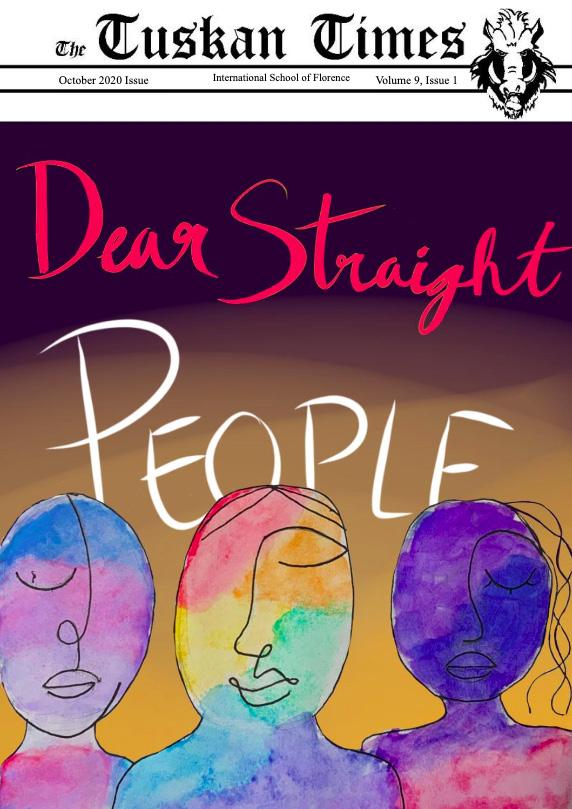
4 minute read
The Earth In 50 Years, Giovanni Lebole
THE EARTH IN 50 YEARS
GIOVANNI LEBOLE (‘22)
As part of our “Sharing the Planet” theme in the English B HL class, students were asked to imagine the Earth in 50 years’ time, and to think about what kind of world they would like their children to inherit, taking into consideration what environmental problems they will face and how they might be overcome.
What will it look like in 50 years?
Emilio Salgari wrote the first Italian science fiction novel, in 1907. It was to my knowledge the most accurate guessing in our history. He managed to predict the invention of screens almost forty years before their diffusion and beyond many other things. He predicted that weapons of mass-destruction would become so powerful that most major conflicts (and the great war he also predicted) would end, a fact that many people today still don’t get. But he was also one of the first people to think that the benefits of globalization would have powerful side effects, with the extinction of most species and cultures and fatal pollution caused by the energetic greed of humans.
Although ‘Il Duemila’ mentioned the main side effects to possibly scare young readers, he guessed his problematics quite well and they are all now in our agendas marked as a “solve later”.

During our history, we first found energy in wood and destroyed the vast majority of forest land around us. Then we discovered whale oil and nearly extinguished them, now we are using coal and oil in a visibly unsustainable way.
In fifty years, one of the most predictable results will be the drop of unsustainable resources, first the coal then the oil, causing an increase of natural gases and hydrogen as energy. Tropical forest rivers will have an increase in exploitation as an energetic resource.
One of the main topics of research will be in the transportation of energy. Maybe energetically sustainable locations will transport energy in the form of chemical energy, charging energy with reactions in chemicals that will later be combusted; like photosynthesis builds glucose using energy, then cell respiration does the opposite reaction releasing energy.
Almost surely, the loss of all non-protected biodiverse habitats will extinguish many of the existing species, 50% of all known living species is endemic to a jungle, and literally eight million hectares of rainforest only are lost each year, and this number exponentially increases due majorly to semi-tyrannies of Brazil, all south Asia and Congo (Russia & Canada play the major role in the world’s forest loss) (fao.un). The intentional and accidental introduction of invasive species will continue to cause local environmental crises all over the world. Hopefully, the increase in healthcare will diminish fatality in poor countries as it has done in the most developed states, ending overpopulation.
Other more political factors will be the birth of both states and federations, independent movements have created many states (South Sudan, East Timor, Kosovo, all SU countries & eastern Europe) and the UN prevents the absolution of them through war. But federations will increase due to the globalization of economy, culture and because the progression of education will slowly diminish nationalism and patriotism, being the fruit of a poor and biased education. I also predict that the existing federation’s influence over citizens will grow stronger than its individual states, as is happening in the EU. Following the historical trend, the political hemisphere will shift left; as factors such as minimum wage & working conditions, maternity, women’s and minority’s rights, divorce and LGBT marriage and adoption, etc... were once considered extreme left and are now normal. Probably in fifty years, more ‘left’ opinions will be considered normal like increasing taxes to higher wages and more state services like education, transportation, health care, housing, etc… Probably most religions will disappear or diminish and possibly religious education in youth will be considered unethical.
Globalization will have many other effects like the loss of local languages to substitute English. And the loss of many customs and traditions will always incite conservators to slow down progress and the destruction of barriers of politico-economic, linguistic, and cultural barriers around the world.
As a quick explicit allusion to the exclusion of minorities, I hope that soon, terms used to offend entities, races, gender & preferences, or religion, will not be banned or tabooed, but will instead not have any offensive meaning because of a more inclusive society, just as if I were to offend someone using the word women, it won’t make sense.
Censure and fear don’t stop the spread of hatred, the pure reason we feel the need to offend, does.










